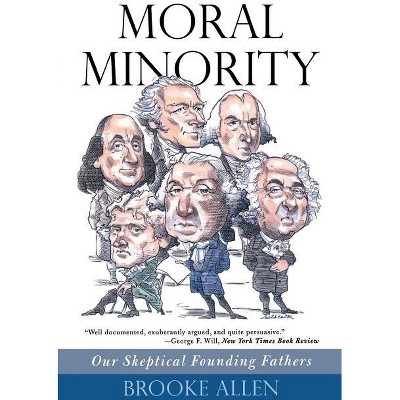Sponsored

Cotton and Race in the Making of America - by Gene Dattel (Paperback)
$13.99Save $4.96 (26% off)
In Stock
Eligible for registries and wish lists
Sponsored
About this item
Highlights
- Since the earliest days of colonial America, the relationship between cotton and the African-American experience has been central to the history of the republic.
- About the Author: Gene Dattel grew up in the cotton country of the Mississippi Delta and studied history at Yale and law at Vanderbilt.
- 432 Pages
- History, United States
Description
About the Book
Since the earliest days of colonial America, the relationship between cotton and the African-American experience has been central to the history of the republic. America's most serious social tragedy, slavery and its legacy, spread only where cotton could be grown. Gene Dattel...Book Synopsis
Since the earliest days of colonial America, the relationship between cotton and the African-American experience has been central to the history of the republic. America's most serious social tragedy, slavery and its legacy, spread only where cotton could be grown. Gene Dattel's pioneering study explores the historical roots of these most central social issues. In telling detail Mr. Dattel shows why the vastly underappreciated story of cotton is a key to understanding America's rise to economic power.Review Quotes
A fascinating account of an essential aspect of American history. Gene Dattel brings clarity and insight to a subject we've long known about but not known well. A model for integrating economic, social, and political history--and a terrific read too.
A very powerful and informative book. . . . Once I started to read it I was hooked. . . . A landmark, combining a firm grasp of finance and its controlling impact on the pattern of rural life in cotton growing regions with human sympathy for both field hands and planters.
Although most of the facts in this book will be familiar, Dattel nicely draws together the literature on the cotton South, financial markets, and northern racism to make the compelling argument that the South's desire for cotton and northern complicity irrevocably altered American racial history. . . . Dattel's choice to conclude with a technological innovation fits well with one of his underlying themes: history is largely shaped by technology and finance.
Books about American history tend to be either triumphal or highly critical. Gene Dattel's study of the racial legacy of cotton, America's leading export up to World War II, is neither. Above all, it is informed, honest, and balanced. Dattel explains insightfully just how slavery and racial discrimination came to plague our nation's ideals and the promise of American life. Mostly it was a by-product--north and south, east and west--of trying to earn a buck, of pursuing the Almighty Dollar. His book is a gem--one of the finest works on the American national experience to appear in many years.
Cotton and Race demonstrates clearly and coherently the importance of slavery and commodity agriculture to the economic history of the United States. . . . The book provides a satisfying overview of the scholarly literature and its findings. . . . It is the author's tone that makes this book useful, as well as the organization of material. . . . For the average student in a general U.S. history survey, or an upper-level class in southern business or history, Dattel hits the nail on the head.
Dattel connects these forces in a way that offers a fresh analysis of King Cotton's place in US history. . . . Dattel goes to great lengths to explicate how the arrangements of these banking, transportation, and manufacturing concerns affected life on southern farms. . . . A highly readable non-academic sweep through cotton's impact on American civilization, [the reader] will not be disappointed.
Don't miss this one.
Eugene Dattel's command of the details of American economic and social life is impressive in this sweeping study of the relationship between cotton and its human legacy in the treatment of African Americans. The book is full of sage judgments and fresh insights, eminently fair and unflinching in its critical assessments. He shows the power of finance and the search for profit in shaping American attitudes from the Constitutional Convention to contemporary issues of cotton's decline and the search for social justice for the people who worked the fields of this global crop. Dattel skillfully portrays the spaces of cotton's kingdom, from the Mississippi Delta fields to the board rooms of New York City's financial companies, and offers compelling evidence of the materialism that drove American life around cotton, often compromising the better angels of our nature.
For many people, Gene Dattel's study will be an eye-opener guaranteed to change their idea of the American experience. . . . A narrative that is both an impressive work of history and an important sociological masterwork.
Gene Dattel grew up in the Mississippi Delta, historically the center of cotton production in the United States, and a major target of voter registration workers in the 1960s. Thereafter he spent twenty years on Wall Street. These experiences superbly position him to remind us, in overwhelmingly persuasive detail, that for almost a century and a half cotton was America's leading export; and that before, during, and after the Civil War, white America, North as well as South, endeavored to keep an African American labor force 'contained' in the cotton fields. Thus cotton was the foundation of both the growth of the national economy and of racism in the United States.
Gene Dattel has produced a superb study of King Cotton's reign over the United States of America. Though exceptionally well versed in the economic history of cotton production, he never loses sight of the human suffering caused by slavery and its consequences. He also gives a first-class account of the politics of cotton. From the Constitution to the Civil War to the Civil Rights movement, each of the key events in the history of the United States looks quite different when you understand the (usually malign) role King Cotton played.
Gene Dattel has written a very important and necessary book, by locating the expansion of cotton production as a driving force not only in the antebellum South, but in the economy at large. He exposes slave-produced cotton's central role in causing the Civil War and as the global economic engine that prolonged slavery. Cotton was coveted by New York merchants and the textile barons of England and New England. He shows that after the Civil War cotton and race remained linked until technology finally displaced black labor. He devastatingly critiques the complicit role of the racist North in containing African Americans in the cotton fields. The legacy of this vital crop was economic growth and the social tragedy of slavery and segregation. No examination of American heritage is complete without an understanding of the force that cotton wrought upon its economic and social landscape. America's racial dilemma cannot be sequestered to one part of the country.
Gene Dattel turns economic history into a gripping narrative in this sweeping synthesis of an important but underappreciated chapter in the American past. From Whitney's gin to the mechanical picker, Dattel shows just how close the links have been between King Cotton and the race issue. This book is highly recommended.
Gene Dattel's book tells the story of the irresistible power of cotton that changed the destiny of the nation-not just the region. America's material obsession blossomed in the cotton fields, where blacks were trapped. Racial hostility-both North and South-was the enabler. His book masterfully captures the history and its painful legacy.
I am very impressed by the extensiveness of the research, the quality of the writing, and the vigor of the narrative. Gene Dattel has produced an important book that shows how 'King Cotton' could, all too often, be a cruel tyrant. The book will be welcomed by both specialists and the general reader.
Independent scholar Dattel provides a thoughtful analysis of cotton's economic power and the ways in which it helped shape race relations in the U.S. . . . Recommended.
The book is as important as it is provocative. . . . Dattel makes a valuable contribution indeed.
This is a book not just for those who grew up in the cotton fields of Mississippi as I did, but far more than that it is a challenging and compelling account of the complex role which cotton has played in the economic, racial, and political history of our nation. No one is better equipped to present that story than Gene Dattel, a superbly gifted writer, who also happens to possess an encyclopedic knowledge of this fascinating subject. This volume elevates to an important new level our comprehension and appreciation of a largely neglected chapter in our conflicted past.
This is a highly readable account of the centrality of cotton in any attempt to understand the dynamic historical interplay of race relations and economic development in the United States. Paraphrasing Marx, the book argues that without slavery there would have been no cotton and without cotton no modern industry. . . . Compelling.
This is an engrossing and revealing study. It should be read not just by history buffs but by all Americans who want to understand the events and forces that shaped and left their imprint on our country. The book captures with great style and intensity the overwhelming influence of cotton and slavery on our economy, finances, social behavior, and political life. Cotton and slavery prevented the formation of a more perfect union in 1776 and as the author concludes America no longer needs cotton, but still bears cotton's human legacy.
This is an epic story with a deeply tragic element to it, as the book's subtitle makes clear; and Dattel explores it with a steeliness that raises the most serious questions about the nature of the American democratic experiment today.
Two themes, one explicit, one implicit, compete in this exploration of the link between the development of American capitalism and the devastation of the African-American community. The price of cotton as the determinant of America's destiny, influencing and even overcoming individual will and ethical behavior is the fully explicit one. . . . The secondary and competing theme is Northern complicity in the slave trade, the cotton economy, segregation, racism and the development of the black underclass in the North and South, with its destructive behavioral characteristics.
About the Author
Gene Dattel grew up in the cotton country of the Mississippi Delta and studied history at Yale and law at Vanderbilt. He then embarked on a twenty-year career in financial capital markets as a managing director at Salomon Brothers and at Morgan Stanley. A consultant to major financial institutions and to the Pentagon, he established a reputation as a foremost authority on Asian economies. His The Sun That Never Rose remains the definitive work on Japanese financial institutions in the 1980s. Mr. Dattel is now an independent scholar who lectures widely and has served as an adviser to the New York Historical Society and the B. B. King Museum. He lives in New York City. For more information, see www.genedattel.com.Dimensions (Overall): 9.22 Inches (H) x 6.14 Inches (W) x 1.23 Inches (D)
Weight: 1.49 Pounds
Suggested Age: 22 Years and Up
Number of Pages: 432
Genre: History
Sub-Genre: United States
Publisher: Ivan R. Dee Publisher
Theme: State & Local
Format: Paperback
Author: Gene Dattel
Language: English
Street Date: December 16, 2011
TCIN: 1004175622
UPC: 9781566639682
Item Number (DPCI): 247-28-5468
Origin: Made in the USA or Imported
If the item details aren’t accurate or complete, we want to know about it.
Shipping details
Estimated ship dimensions: 1.23 inches length x 6.14 inches width x 9.22 inches height
Estimated ship weight: 1.49 pounds
We regret that this item cannot be shipped to PO Boxes.
This item cannot be shipped to the following locations: American Samoa (see also separate entry under AS), Guam (see also separate entry under GU), Northern Mariana Islands, Puerto Rico (see also separate entry under PR), United States Minor Outlying Islands, Virgin Islands, U.S., APO/FPO
Return details
This item can be returned to any Target store or Target.com.
This item must be returned within 90 days of the date it was purchased in store, shipped, delivered by a Shipt shopper, or made ready for pickup.
See the return policy for complete information.
Trending Non-Fiction

$15.68
Buy 2, get 1 free select books
4.7 out of 5 stars with 182 ratings

$19.31
was $20.98 New lower price
Buy 2, get 1 free select books
4.1 out of 5 stars with 54 ratings

$19.58
MSRP $29.00
Buy 2, get 1 free select books
4.7 out of 5 stars with 11 ratings

$4.59
MSRP $7.99
Buy 2, get 1 free select books
4.8 out of 5 stars with 116 ratings

$6.20
MSRP $10.95
Buy 2, get 1 free select books
4.8 out of 5 stars with 33 ratings

$7.09
MSRP $9.99
Buy 2, get 1 free select books
4.9 out of 5 stars with 45 ratings





